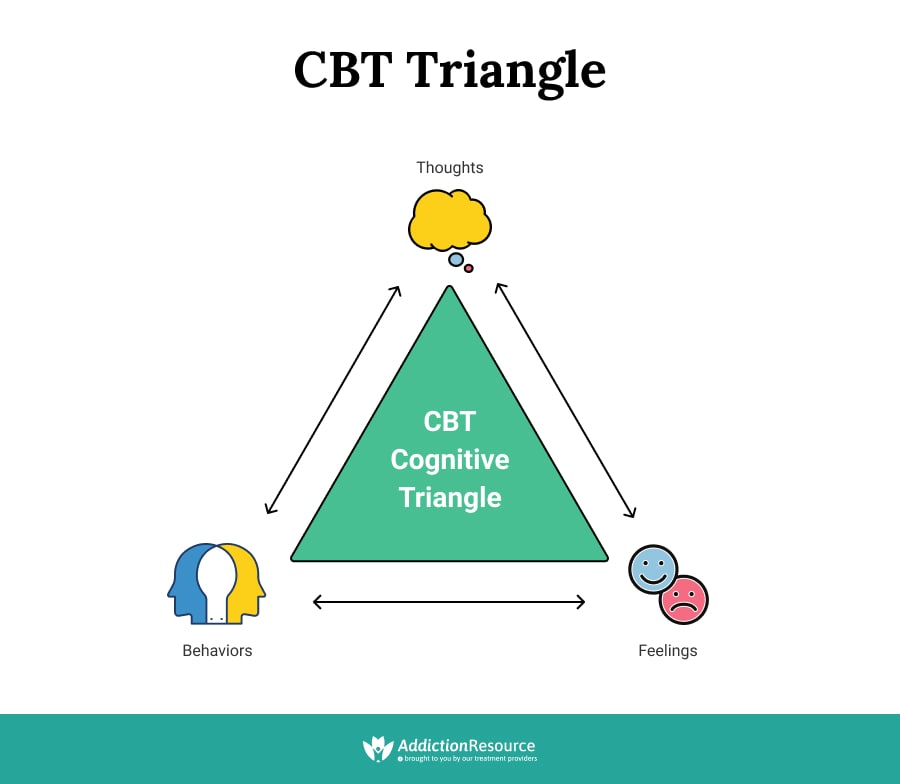Cognitive behavioral therapy (CBT) is an umbrella term for a set of scientifically proven psychological treatments that are effective for many mental health disorders. It was developed more than half a century ago by American psychiatrist Dr. Aaron T. Beck and is commonly used to treat various mental health disorders, such as anxiety, phobias, personality disorders, schizophrenia, marital discord, and substance abuse.
Table Of Contents:
Psychotherapists (psychiatrists, psychologists, and social workers) use CBT for addiction by teaching patients specific skills that are useful in treating substance abuse. CBT therapy is widely available as part of inpatient, outpatient, individual, and group therapy programs. CBT therapy is a flexible low-risk therapy and has a good reputation for being effective in substance abuse recovery.
What Is Cognitive Behavioral Therapy?
CBT therapy is a type of short-term psychotherapy usually conducted over 6-20 sessions. During these sessions, a therapist focuses on helping the patient understand the connection between thoughts, emotions, and behaviors. CBT techniques aim to help people work with their disturbing thoughts and feelings to overcome mental health issues such as addiction, anxiety, or depression. The therapists intervene at different stages in the thought-emotion-behavior cycle to help recovering addicts learn the skills to choose positive thoughts and behaviors.
Cognitive behavioral treatment is a research-based, results-oriented, hands-on treatment that takes a practical problem-solving approach to change thinking patterns and behaviors in recovering addicts.
Although it was initially developed as a therapy for depression, later CBT has been found to be useful for other mental health problems.
For Example:
- Post-traumatic stress disorder (PTSD)
- Anxiety
- Psychosis
- Attention deficit disorder
- Bipolar disorder
- Eating disorders
- Obsessive-compulsive disorder
- Addiction
Many people with substance abuse problems benefit from CBT techniques. In fact, CBT for substance abuse disorder is a widely used practice backed up by evidence. Increased awareness of thoughts, emotions, actions and their consequences leads to a better understanding of the connections between the three. Addicts can learn to understand the motivations that led to substance abuse in the first place.
CBT has some things in common with rational emotive behavioral therapy, which was developed on its basis. However, the latter mostly focuses on dealing with irrational thoughts and beliefs which lead to unpleasant consequences.
Cognitive Behavior Therapy Components
A key component of CBT for addiction is understanding how thoughts, emotions, and behaviors influence each other.

For example, thoughts and behaviors have an impact on a person’s emotions. On the other hand, feelings or emotions influence a person’s thoughts and behaviors. During cognitive behavioral therapy exercises, recovering addicts are taught to modify their feelings by changing their thoughts and behaviors. The goal is to overcome addiction by acquiring control over unwanted emotions and thoughts.

Many people are surprised to learn that there is a link between anxiety and drug abuse. CBT addresses coexisting mental health problems that frequently accompany substance abuse. By addressing these underlying psychological disorders, cognitive-behavioral treatment exercises treat the underlying reasons for addiction and recognize signs of relapse in the future.
CBT Sessions Explained
Unwelcome feelings and behaviors are usually a consequence of a person’s environment or past experiences. Through CBT techniques, recovering addicts realize that unwanted thoughts, feelings, and actions are irrational. The exercises help the addict in understanding why they experience certain feelings or behave in a particular way.
CBT for substance abuse equips an individual to overcome addiction by revealing the emotions and actions that lead to it.
Many addicts automatically think negative thoughts. These thoughts are impulsive and based on feelings of fear, self-doubt, and misconceptions. Addicts often try to mask these painful feelings with alcohol or recreational drug use, which over time lead to addiction. Cognitive behavioral therapy involves revisiting painful emotions and learning positive behaviors to replace substance abuse as a coping mechanism.
A CBT therapist helps recovering addicts focus and reexamine destructive thought patterns. These flawed perceptions change the way an individual looks at the present and the future.
Cognitive Behavior Therapy Addresses Five Common Cognitive Distortions That Affect Addiction Recovery:
- Dwelling only on negative emotions
- Disqualifying positives thoughts as inconsequential
- Generalizing negative events as never-ending
- Perceiving a situation as absolutely black or white
- Assuming certain thoughts and beliefs are true without evidence
During cognitive behavior treatment, clients learn interventions to reduce stress and anxiety, control negative behaviors, and improve general well-being.
CBT for Addiction
Often, automatic negative thoughts are the underlying cause of addiction disorders. CBT for substance abuse helps overcome alcoholism and drug addiction by dismissing false beliefs, developing mood-improving skills, and teaching the client effective communication.
Triggers or cravings prevent many addicts from getting clean and remaining sober.

According to the National Institute on Drug Abuse, cognitive behavior therapy helps recovering addicts identify and correct destructive behavioral patterns. A key element of CBT therapy is anticipating triggers and developing the self-control to cope with them. The patient can learn to recognize the circumstances that trigger drinking or drug use, remove themselves from the situation, and use CBT techniques to alleviate the thoughts and feelings that lead to abuse.
CBT Techniques
There are some specific cognitive behavioral therapy techniques that are effective at all stages of change in recovery.
Examples of Techniques Used by Therapists Are Described Below:
- Keep a record of negative thoughts and look for objective evidence to disprove these automatic thoughts. The goal is to develop more balanced thinking and critically evaluate thought patterns.
- Replace negative thoughts with positive ones and observe the effect on behavior. The goal is to discover what works for the individual in terms of self-criticism or self-approval.
- Recall a memory that brings up strong negative emotions. The goal is to revisit the painful memories, and over a period of time, reduce the anxiety they cause.
- Perform pleasant activities that are fun and healthy and can be easily incorporated into the daily routine. The goal is to reduce automatic negative thoughts and the need to drink or use drugs to suppress these painful feelings.
Typical sessions last 45 minutes. CBT therapist serves both as a teacher and a teammate and discusses the client’s stressors, irrational thoughts, and negative emotions. The exercises involve challenging negative thinking and developing positive coping skills for present and future use.
Cognitive behavioral therapy techniques include relaxation exercises, being more assertive, improving insight, modifying thinking patterns, and monitoring and correcting negative behaviors.
Effectiveness
Cognitive behavior therapy has existed for more than 50 years, and many pieces of research have been carried out about its use for various conditions.
In many studies, CBT shows high response rates compared to other treatments. Research also proves that it is very effective in treating anxiety, reducing anxiety levels in social situations, and helping deal with phobias.
Moreover, it is recognized as equivalent in efficacy to pharmacological treatment of depression during the acute phase of symptoms. However, it should be applied together with other treatments, either psychotherapy or medication, in most cases. One study on the prevention of recurrent depression has shown that cognitive behavioral therapy can significantly lower the residual symptoms after successful antidepressant treatment. The CBT group also had a lower relapse rate, at 25%.
Evidence from multiple studies also proves that CBT for addiction is an effective treatment. It includes many interventions that can be carried out both in group and individual settings.
Cognitive Behavior Therapy Versus Other Therapies
Cognitive behavioral therapy examples differ from other psychotherapies in several vital ways. First, unlike psychodynamic therapy, it does not try to get to the bottom of a person’s subconscious to determine their actions or behavior. Second, CBT therapy does not take a patient-centered approach where the therapist passively listens, allowing the patient to resolve the issues independently. In other words, a recovering addict will do more than just talk, and a cognitive-behavioral therapist will do more than simply listen during the session.
The fundamental principle of cognitive behavior therapy is to address harmful thought patterns and implement more positive ways of thinking in people. This helps regulate distressing feelings and control destructive behavior. The therapist and the client work in collaboration to seek alternate thought patterns.

CBT therapy can be conducted in individual and group sessions, making it very flexible, unlike some other psychotherapies. Patients can apply the practical skills and coping strategies they learn during these sessions to everyday life.
Cognitive behavior therapy is a more hands-on approach compared to other less engaging psychotherapy techniques, which may take years to have a meaningful impact. Cognitive behavior therapy is a goal-oriented, problem-focused, actionable, adaptable treatment. This short-term treatment often produces measurable results in less than 20 sessions. For this reason, the cognitive behavioral approach is included in many addiction treatment programs to help recovering addicts obtain the immediate coping strategies they need.
Dealing with substance abuse is not easy, but with all the therapies available now, it is possible. Don’t hesitate to ask for help and get treatment most appropriate for your specific situation.
Find Drug Rehabilitation Centers Near You Anywhere In the US
Addiction Resource team has compiled an extensive list of the top drug rehabilitation facilities around the country. Click on the state you are interested in, and you'll get a list of the best centers in the area, along with their levels of care, working hours, and contact information. Haven't found the rehab you need? Call the toll-free helpline below for professional assistance.

- Alabama
- Alaska
- Arizona
- Arkansas
- California
- Colorado
- Connecticut
- Delaware
- Florida
- Georgia
- Hawaii
- Idaho
- Illinois
- Indiana
- Iowa
- Kansas
- Kentucky
- Louisiana
- Maine
- Maryland
- Massachusetts
- Michigan
- Minnesota
- Mississippi
- Missouri
- Montana
- Nebraska
- Nevada
- New Hampshire
- New Jersey
- New Mexico
- New York
- North Carolina
- North Dakota
- Ohio
- Oklahoma
- Oregon
- Pennsylvania
- Rhode Island
- South Carolina
- South Dakota
- Tennessee
- Texas
- Utah
- Vermont
- Virginia
- Washington
- West Virginia
- Wisconsin
- Wyoming
Hope Without Commitment
Find the best treatment options. Call our free and confidential helpline
Most private insurances accepted
Page Sources
- Dalton, R. F. (2005). Cognitive distortions identified with type and frequency of self-reported substance abuse usage. The Ohio State University. https://etd.ohiolink.edu/apexprod/rws_etd/send_file/send?accession=osu1133779846&disposition=inline
- National Institute on Drug Abuse, Principles of Drug Addiction Treatment: A Research-Based Guide (Third Edition), https://www.drugabuse.gov/publications/principles-drug-addiction-treatment-research-based-guide-third-edition/evidence-based-approaches-to-drug-addiction-treatment/behavioral
- Cahill, S. P., Rothbaum, B. O., Resick, P. A., & Follette, V. M. (2009). Cognitive-behavioral therapy for adults. https://link.springer.com/article/10.1007%2Fs10608-012-9476-1
- Tsitsas, G. D., & Paschali, A. A. (2014). A cognitive-behavior therapy applied to a social anxiety disorder and a specific phobia, case study. Health psychology research, 2(3). https://www.ncbi.nlm.nih.gov/pmc/articles/PMC4768591/
- Fava, G. A., Rafanelli, C., Grandi, S., Conti, S., & Belluardo, P. (1998). Prevention of recurrent depression with cognitive behavioral therapy: preliminary findings. Archives of general psychiatry, 55(9), 816-820. https://jamanetwork.com/journals/jamapsychiatry/article-abstract/204267
- Lopez, M. A., & Basco, M. A. (2015). Effectiveness of cognitive behavioral therapy in public mental health: Comparison to treatment as usual for treatment-resistant depression. Administration and Policy in Mental Health and Mental Health Services Research, 42(1), 87-98. https://www.ncbi.nlm.nih.gov/pmc/articles/PMC4183730/
- Dutra, L., Stathopoulou, G., Basden, S. L., Leyro, T. M., Powers, M. B., & Otto, M. W. (2008). A meta-analytic review of psychosocial interventions for substance use disorders. American Journal of Psychiatry, 165(2), 179-187. https://pubmed.ncbi.nlm.nih.gov/18198270/
- Arch, J. J., & Craske, M. G. (2008). Acceptance and commitment therapy and cognitive behavioral therapy for anxiety disorders: Different treatments, similar mechanisms?. Clinical psychology: Science and practice, 15(4), 263. https://www.colorado.edu/clinicalpsychology/sites/default/files/attached-files/arch-and-craske-act-v-cbt-2008.pdf
- McHugh, R. K., Hearon, B. A., & Otto, M. W. (2010). Cognitive behavioral therapy for substance use disorders. Psychiatric Clinics, 33(3), 511-525. https://www.ncbi.nlm.nih.gov/pmc/articles/PMC2897895/













